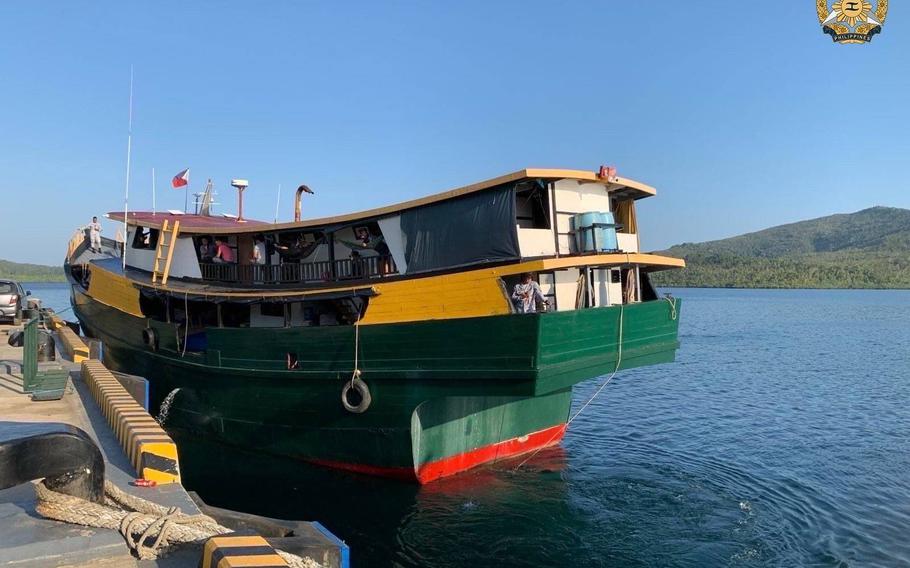
Chinese coast guard vessels fired water cannons on the Unaizah May 4, seen here preparing for departure from Puerto Princesa City, Palawan, on March 22, 2024, during a confrontation near Second Thomas Shoal on March 23, 2024. (Armed Forces of the Philippines)
At least a dozen embassies voiced support of the Philippines over the weekend after Chinese coast guard ships fired water cannons at Philippine vessels near a contested maritime feature in the South China Sea.
The incident Saturday took place near Second Thomas Shoal and resulted in “significant damage” to a Philippine supply ship and injuries to Filipino personnel, according to a Saturday statement from the Philippines’ National Task Force for the West Philippine Sea.
Afterward, ambassadors from Europe and North America called for a peaceful resolution and restraint in a flurry of posts to X, formerly Twitter, on Saturday and Sunday.
“Dangerous maneuvers and the repeated use of water cannons by Chinese vessels against Philippines vessels today endangered lives and pose a serious threat to regional peace and stability,” wrote David Hartman, Canada’s ambassador to the Philippines, in a Saturday post to X. “We urge the peaceful resolution of disputes in accordance with international law.”
The U.S. also condemned China’s actions as “destabilizing to the region” and which shows “a clear disregard for international law,” according to a statement Saturday from the State Department.
U.S. Ambassador to the Philippines MaryKay Carlson, in a post Saturday on X, said Beijing has repeatedly used similar actions to disrupt the Philippines’ lawful activities in the region.
Second Thomas Shoal, known in the Philippines as Ayungin Shoal and in China as Ren’ai Reef, is a flashpoint between the two countries since the Philippines intentionally grounded the World War II-era ship BRP Sierra Madre on the feature in 1999.
Similar incidents have taken place over the past decade, with recent episodes on March 5 and Aug. 5.
The U.S. is bound by treaty to defend the Philippines in the case of armed conflict, but the use of less lethal weapons like water cannons is likely to keep the issue “short of conflict,” according to Ja Ian Chong, associate professor of political science at the National University of Singapore.
China “is aware of U.S. treaty obligations and is likely to avoid escalation and a major confrontation with the United States if it can help it,” he told Stars and Stripes by email Monday.
If deaths occur because of Chinese actions, however, then “all bets are off,” and “Philippine public sentiment and pressure may demand greater resolve” from the administration of Philippine President Ferdinand Marcos Jr., Chong said.
In 2016, an international tribunal determined the shoal is part of the Philippines’ exclusive economic zone, but China continues to dispute the ruling.
On Saturday, numerous ambassadors to the Philippines, including German Ambassador Andreas Pfaffernoschke, Dutch Ambassador Marielle Geraedts and French Ambassador Marie Fontanel called on Beijing to respect that ruling.
“We oppose any threat or use of force contrary to international law and recall the importance of resolving disputes through dialogue. We also recall the decision rendered by the Arbitral Court on July 12, 2016,” Fontanel said in a Saturday post to X.
Beijing defended its actions. Wu Qian, spokesman for China’s Defense Ministry, said China’s response was “reasonable, lawful, professional and standard,” and that the incident was “entirely provoked by the Philippines,” the Chinese state-sponsored news agency China Military Online said Sunday.